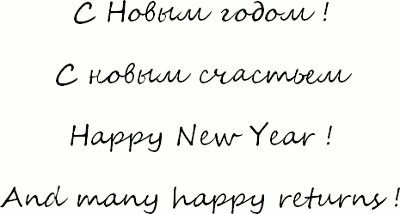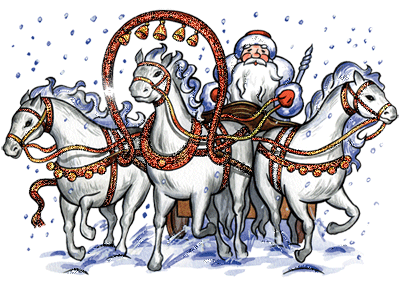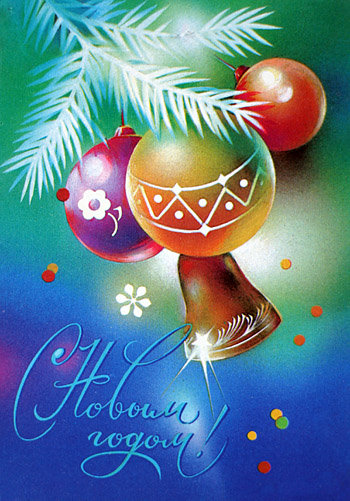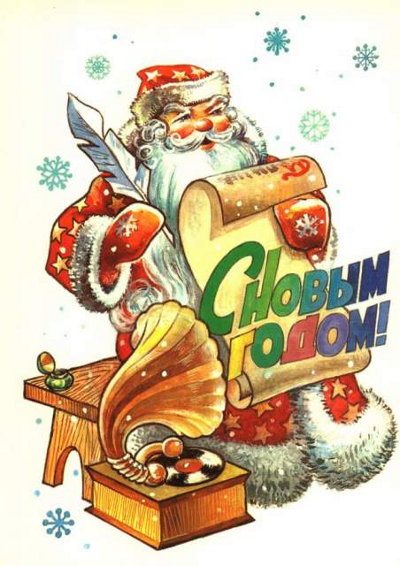Category: "New Year's"
Новый год — 2010
To wish someone well on December 31st, in English we say “Happy New Year.” If we are having an anal retentive moment and wish to use a complete sentence, we say “We wish you a Happy New Year.” (Nota bene: we usually capitalize all three words.) The Russian equivalents are «С Новым годом» and «Поздравляем вас с Новым годом». The latter literally means “We congratulate you upon the occasion of the New Year.” (Nota bene: the single Russian sound «с» is equivalent to the English phrase “upon the occasion of”. See how superior Russian is to the decaying languages of the West? Begin learning Russian immediately, if not sooner.)
The person you congratulate appears in accusative case, so if you want to add a laconic “you, too”, then the you must again use the accusative case:
| — С Новым годом! — И вас, тоже. |
“Happy New Year!” “You, too.” |
At Christmastide we often supplement “Merry Christmas” with “and many happy returns!” The Russians often supplement «с Новым годом» with «с новым счастьем» “and new happiness/fortune”, which, come to think of it, is pretty similar in spirit to the English phrase, though obviously not a word-for-word translation. It is not traditional in English to add “many happy returns” to a New Year's wish, but on this occasion we’ll let that slide:


Поздравлять/поздравить

Ah, pity the poor foreigner who has to come to the US and offer his congratulations to someone. If it's December 25th, he must say “Merry Christmas,” whereas “Happy Christmas” just sounds weird. If it's January first, he must say “Happy New Year,” whereas “Merry New Year” sounds freakish. If it's a wedding or birth or a graduation, then he must say “congratulations.” It's enough to drive a foreigner back home.
The Russians, on the other hand, have a verb that works for absolutely every holiday and well-wishing event, and that is the verb поздравлять/поздравить “to congratulate.” It is conjugated like this:
| to congratulate | ||
| Imperfective | Perfective | |
| Infinitive | поздравлять | поздравить |
| Past | поздравлял поздравляла поздравляло поздравляли |
поздравил поздравила поздравило поздравили |
| Present | поздравляю поздравляешь поздравляет поздравляем поздравляете поздравляют |
No such thing as perfective present in Russian. |
| Future |
буду поздравлять будешь поздравлять будет поздравлять будем поздравлять будете поздравлять будут поздравлять |
поздравлю поздравишь поздравит поздравим поздравите поздравят |
| Imperative | поздравляй(те) | поздравь(те) |
The person you congratulate goes in the accusative case:
| Поздравляю тебя! | Congratulations! |
| Поздравляю вас! | Congratulations! |
| Она поздравила меня. | She congratulated me. |
| Виктор поздравил её | Victor congratulated her. |
If you mention the event triggering the congratulations, it goes in the instrumental case after the preposition с:
| Поздравляю тебя с Новым годом! | Happy New Year! |
| Поздравляю вас с Рождеством Христовым! | Merry Christmas! |
The Russians also sometimes simply skip the person and the verb, leaving only the prepositonal phrase:
| С Новым годом! | Happy New Year! |
| С Рождеством Христовым! | Merry Christmas! |
Although the event may be the name of a holiday, it could also be a good grade, or a new car, or pretty well anything else:
| Миша поздравил Таню с пятёркой. | Misha congratulated Tanya for getting an A. |
| Поздравляю с новой машиной! | Congatulations on the new car! |
| — Здравствуйте, Иван Андреевич! Я слышал, что в прошлом месяце Ваш развод наконец-то был окончательно оформлен. Поздравляю Вас! — Благодарю Вас. Вас благодарит и моя новая жена. — Что-что? Вы ещё раз женились? Ну… значит… ы-ы-ы… поздравляю Вас и со свадьбой. — От всей души благодарю. |
“Hello, Ivan Andreevich, I heard that last month your divorce was finalized. Congratulations!” “I thank you very much. My new wife also thanks you.” “What's that? You've already remarried? Well… so… ummm… congratulations upon your marriage.” “I thank you from the bottom of my heart.” |
Ноль, нуль (часть первая)
Russian has two words for zero, and they are ноль and нуль. For most purposes they are completely interchangeable and decline like this:
| Sg | Pl | |
| Nom | ноль | ноли |
| Acc | ноль | ноли |
| Gen | ноля | нолей |
| Pre | ноле | нолях |
| Dat | нолю | нолям |
| Ins | нолём | нолями |
You will most encounter these words is when reading phone numbers out loud. In the US one usually reads phone numbers out loud digit by digit:
| The number | is pronounced |
| 792-0390 | seven nine two oh three nine oh |
In Russia they usually break up a seven-digit number into groups of 3-2-2, and you say ноль only when the zero is the first unit in a group of two or three digits, thus:
| The number | is pronounced |
| 792-03-90 | семьсот девяносто два, ноль три, девяносто |
(The first zero is pronounced as ноль, and the second zero is understood as part of девяносто.)
In the US most people do not refer to the time of day using the twenty-four hour clock (“military time”) unless they have served in the military or are engaged in precise time-keeping functions, but in Russia all official schedules are posted in twenty-four time, so the phrase «ноль часов ноль минут», which means literally “zero hours zero minutes” and can be translated “oh zero hundred” in military parlance, sounds perfectly normal to an average Russian. You can even hear the phrase in the song «В ноль часов и ноль минут» “At midnight,” which is a cute little tune about how hard it is as a child to stay awake all the way till midnight on New Year's Eve. Click the title of the song just above to hear it. Do listen to it. It's charming.

Новый год — 2008
The Russian word for New Year is Новый год. New Year's is a time when friends and family come together to mark the beginning of a new and exciting year. Because many Russians celebrate Christmas on January 7th, there is no need to buy a Christmas tree earlier in the month of December декабрь. So, many people buy and decorate the Christmas tree on New Year's Eve. Many Russian families enjoy gathering with large crowds on New Year's Eve to enjoy special food and drinks. For most Russians, singing around the dinner table and dancing are two important components of a New Year's Eve party.
Last year my family decided to make a New Year's party at my house. We live in a quiet neighborhood, and I had to ask all of our neighbors for permission to play loud music late into the night. My parents invited a few of our Russian friends and they all arrived with tasty dishes and fine wines. As my friend arrived, she said «С Новым годом, Оля! Ты выглядишь очень красиво» “Happy New year Olga! You look very pretty.” Me and my friend were both very excited because one of my parent’s friends had a very handsome son and we both wanted to dance with him that night. As he came inside, I whispered to my friend «Саша такой симпатичный! Я первая буду с ним танцевать!» “Sasha is so cute! I will dance with him first!”. Everyone had a good time that night including me and my girlfriend because we both had a chance to dance with Sasha.
«Я хочу поздравить всех с Новым годом!» “I would like to wish everyone a Happy New Year!”
Don's additional comment: notice that in Russian only the first word of Новый год is capitalized, not the second.